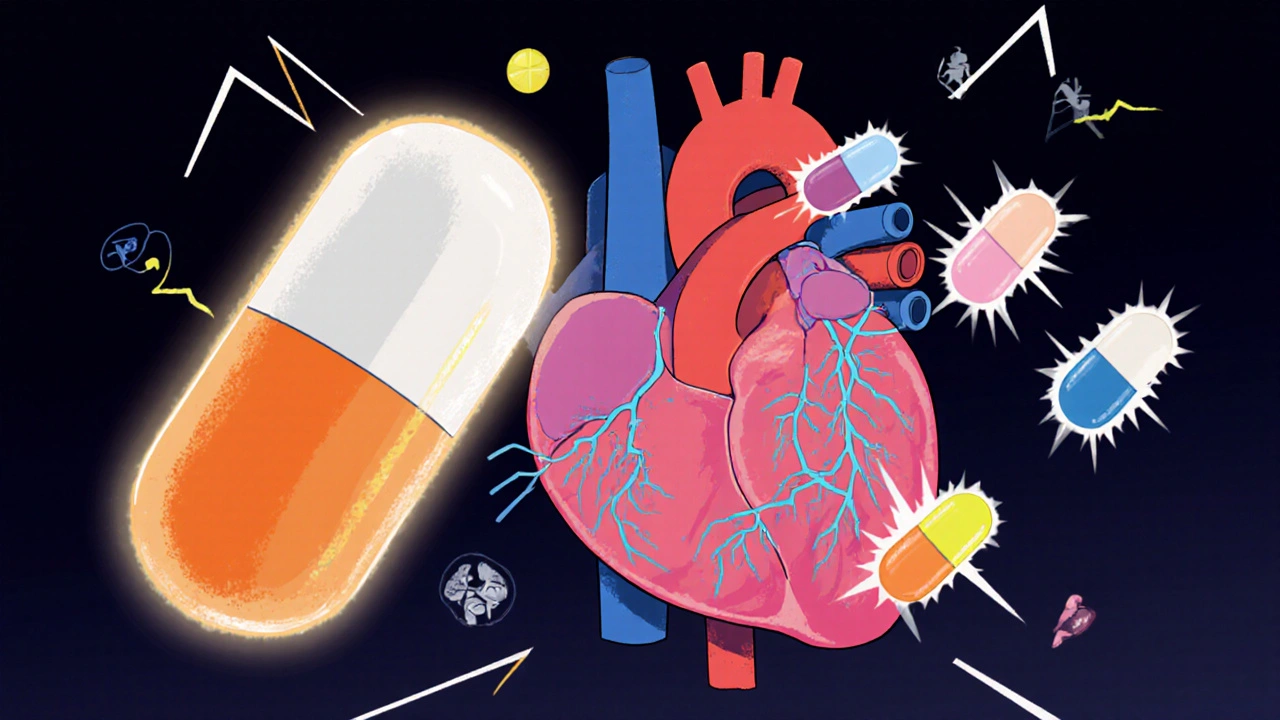
Arrhythmia Drug Safety Calculator
Assess Your Amiodarone Safety Profile
This tool evaluates whether amiodarone (Cordarone) is appropriate for your specific health situation based on key contraindications.
Cordarone (amiodarone) has been a go-to drug for serious heart rhythm problems for decades. But it’s not without risks. Many patients and doctors now wonder: are there safer or more effective options? The answer isn’t simple. While amiodarone works well for stubborn arrhythmias, its long-term side effects can be serious-lung damage, thyroid issues, liver problems, and even vision changes. That’s why alternatives are being used more often, especially for people who need long-term treatment or have other health conditions.
Why Amiodarone Is Still Used
Amiodarone doesn’t just calm the heart-it rewires how heart cells respond to electrical signals. It’s one of the few drugs that works on multiple ion channels, which makes it effective for atrial fibrillation, ventricular tachycardia, and other life-threatening rhythms. Studies show it reduces sudden cardiac death by about 20-30% in high-risk patients, especially after a heart attack or with heart failure.
But here’s the catch: it builds up in your body over time. A single dose can stay active for weeks. That’s why doctors often start patients on a high dose, then cut back. It’s powerful, but it’s also a blunt instrument. Unlike newer drugs that target one specific pathway, amiodarone affects almost everything in the heart-and sometimes, the rest of the body too.
Key Alternatives to Amiodarone
There are three main classes of drugs used to treat arrhythmias when amiodarone isn’t ideal: Class I, Class III, and beta-blockers. Each has its own profile.
- Class I drugs like flecainide and propafenone block sodium channels. They work fast for atrial fibrillation but are risky in people with heart disease-can trigger dangerous rhythms if the heart muscle is damaged.
- Class III drugs like sotalol and dofetilide prolong the heart’s electrical cycle. Sotalol is often used as a first alternative to amiodarone because it’s easier to monitor. Dofetilide requires hospital initiation due to risk of torsades de pointes, a dangerous rhythm.
- Beta-blockers like metoprolol and carvedilol aren’t as strong at stopping arrhythmias, but they’re safer long-term. They’re often combined with other drugs or used for milder cases.
For many patients, especially those with heart failure, dronedarone (Multaq) is a popular choice. It’s similar to amiodarone but without iodine, so it’s less likely to damage the thyroid or lungs. But it’s not for everyone-it can increase death risk in people with severe heart failure or permanent atrial fibrillation.
Comparison Table: Amiodarone vs. Common Alternatives
| Drug | Class | Best For | Major Risks | Monitoring Needed |
|---|---|---|---|---|
| Amiodarone (Cordarone) | III | Severe arrhythmias, post-heart attack, heart failure | Lung toxicity, thyroid dysfunction, liver damage, vision changes, skin discoloration | Monthly blood tests, chest X-rays, thyroid and liver function every 6 months |
| Sotalol | III | Atrial fibrillation, ventricular arrhythmias | Torsades de pointes (risk higher with low potassium or kidney issues) | ECG before and after starting, electrolyte checks |
| Dofetilide | III | Atrial fibrillation | Torsades de pointes, kidney-related dosing issues | Must start in hospital, ECG monitoring for 3 days |
| Flecainide | Ic | Paroxysmal atrial fibrillation in healthy hearts | Pro-arrhythmia in structural heart disease | ECG before use, avoid if heart attack or heart failure |
| Dronedarone (Multaq) | III | Paroxysmal or persistent atrial fibrillation (without severe heart failure) | Worsens heart failure, liver injury, diarrhea | Liver function tests every 2 months |
| Metoprolol | II | Mild arrhythmias, rate control in atrial fibrillation | Low blood pressure, fatigue, worsening asthma | Heart rate and blood pressure checks |
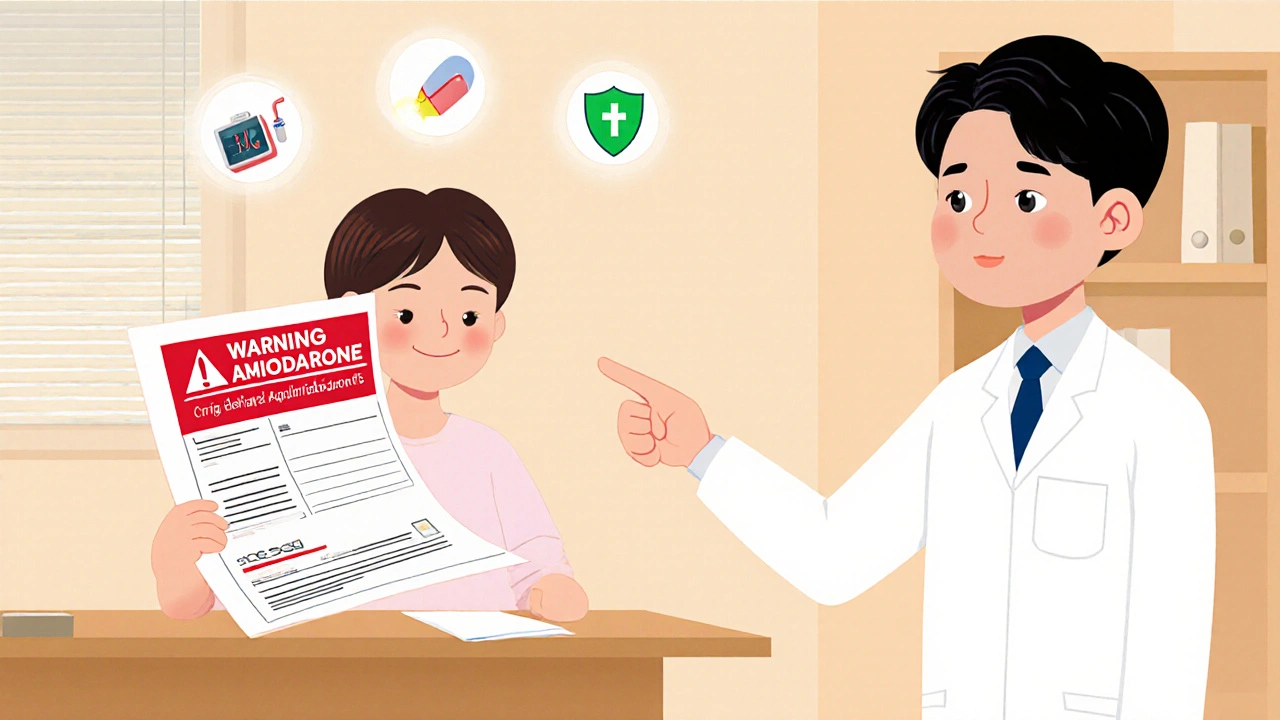
Who Should Avoid Amiodarone?
Amiodarone isn’t a one-size-fits-all solution. It’s dangerous for people with:
- Pre-existing lung disease (like COPD or pulmonary fibrosis)
- Thyroid disorders (especially untreated hyper- or hypothyroidism)
- Severe liver disease
- Pregnancy or plans to become pregnant (it crosses the placenta and can harm the fetus)
- People under 40 without life-threatening arrhythmias
For younger patients with occasional atrial fibrillation, doctors often start with beta-blockers or even a procedure like ablation before even considering amiodarone. It’s not just about effectiveness-it’s about long-term safety. One study found that after five years, over 20% of patients on long-term amiodarone developed significant side effects. That’s why guidelines now recommend using it only when other options have failed or aren’t suitable.
When Alternatives Don’t Work
Some arrhythmias are stubborn. If drugs like sotalol or dronedarone don’t control the rhythm, and amiodarone is the only thing left, doctors will use it-but with tighter monitoring. Blood tests every 3 months, chest X-rays every 6 months, and eye exams yearly become routine. Some patients also get thyroid hormone replacement if amiodarone causes hypothyroidism.
For those who can’t tolerate any oral meds, catheter ablation is a real option. It’s a minimally invasive procedure that burns or freezes the small area of heart tissue causing the bad rhythm. Success rates for atrial fibrillation range from 70-85% after one or two procedures. Many patients who’ve had ablation can stop all antiarrhythmic drugs, including amiodarone.
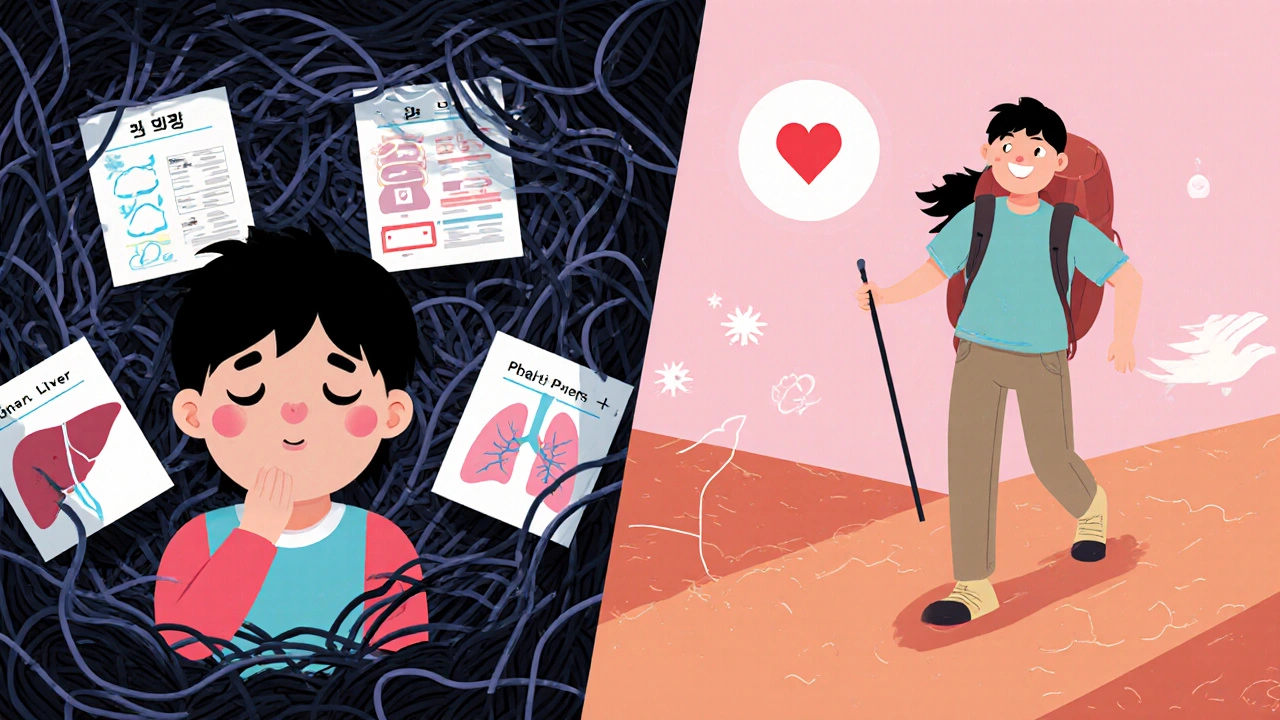
The Bottom Line: Choosing the Right Drug
There’s no single best drug for everyone. The choice depends on:
- What type of arrhythmia you have
- Whether you have heart failure, lung disease, or thyroid problems
- How old you are
- Whether you’ve tried other treatments
- Your tolerance for long-term monitoring
For someone with mild atrial fibrillation and no heart disease, a beta-blocker or flecainide might be enough. For someone with heart failure and frequent dangerous rhythms, amiodarone may be the only choice-even with the risks. But for most people, newer drugs or procedures offer better safety without sacrificing too much effectiveness.
The trend in cardiology is clear: avoid amiodarone unless absolutely necessary. Use it as a last resort, not a first-line option. And always pair it with regular, lifelong monitoring. If you’re on amiodarone, ask your doctor: is this still the best option for me? Or could I switch to something safer?
Is amiodarone still the best drug for atrial fibrillation?
Amiodarone is effective for atrial fibrillation, especially when other drugs fail or when there’s underlying heart disease. But it’s not the best first choice anymore. Due to serious long-term side effects, doctors now prefer dronedarone, sotalol, or even ablation for many patients. Amiodarone is reserved for high-risk cases or when alternatives don’t work.
Can you take amiodarone forever?
Some people take amiodarone for years, but it’s not without risk. The drug accumulates in tissues, and side effects like lung scarring, thyroid problems, and liver damage often appear after 6-12 months. Most patients on long-term amiodarone need monthly blood tests, chest X-rays, and thyroid checks. Many doctors try to reduce the dose or switch to another drug after 6 months if the rhythm is controlled.
What are the safest alternatives to amiodarone?
For most patients, sotalol and dronedarone are the safest oral alternatives. Sotalol works well for many rhythm problems but needs careful monitoring for dangerous heart rhythms. Dronedarone has fewer organ toxicities than amiodarone but should not be used in severe heart failure. For younger patients without structural heart disease, flecainide or propafenone may be options. Ablation is often the safest long-term solution.
Does amiodarone cause weight gain?
Amiodarone doesn’t directly cause weight gain, but it can lead to fluid retention or changes in metabolism due to thyroid dysfunction. Hypothyroidism (low thyroid levels) from amiodarone can cause fatigue, swelling, and weight gain. Regular thyroid tests can catch this early, and hormone replacement can reverse it.
Can you drink alcohol while taking amiodarone?
Alcohol can worsen heart rhythm problems and may increase the risk of liver damage from amiodarone. While occasional light drinking might be okay, heavy or regular alcohol use is strongly discouraged. Always talk to your doctor-your heart condition and liver health will determine what’s safe.
What happens if you stop amiodarone suddenly?
Stopping amiodarone abruptly can cause arrhythmias to return, sometimes worse than before. Because the drug stays in your body for weeks, symptoms might not return immediately. But the risk of rebound arrhythmias is real. Never stop amiodarone without your doctor’s guidance. If switching to another drug, the transition is usually done slowly and under close monitoring.
Next Steps: What to Do If You’re on Amiodarone
If you’re currently taking amiodarone, ask yourself:
- When was your last thyroid, liver, and lung check?
- Have you had an ECG or Holter monitor test in the last 6 months?
- Are you experiencing new fatigue, shortness of breath, or vision changes?
- Has your doctor discussed switching to a safer option?
Many patients stay on amiodarone longer than needed because they’re afraid of the arrhythmia coming back. But with modern alternatives and procedures like ablation, you might not need it anymore. Talk to your cardiologist about your long-term plan-not just your next refill.
11 Comments
Write a comment
More Articles
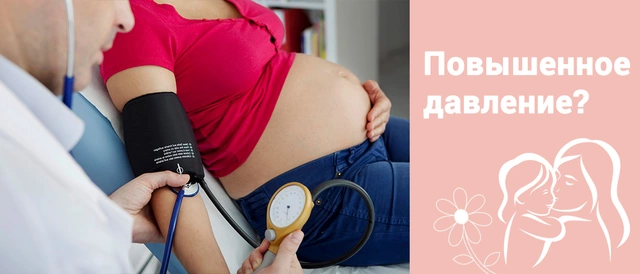
The Role of Azilsartan in Treating Hypertension in Pregnant Women
As a copywriter, I've recently come across the topic of Azilsartan and its role in treating hypertension in pregnant women. It's interesting to know that this medication can help manage high blood pressure during pregnancy, ensuring the well-being of both mother and baby. It's essential to maintain a healthy blood pressure, as uncontrolled hypertension could lead to complications such as preeclampsia. However, it's important to consult with a healthcare professional before taking Azilsartan, as they will be able to determine if it's the right treatment option. Overall, Azilsartan seems to be a promising solution for managing hypertension in pregnant women, contributing to healthier pregnancies.
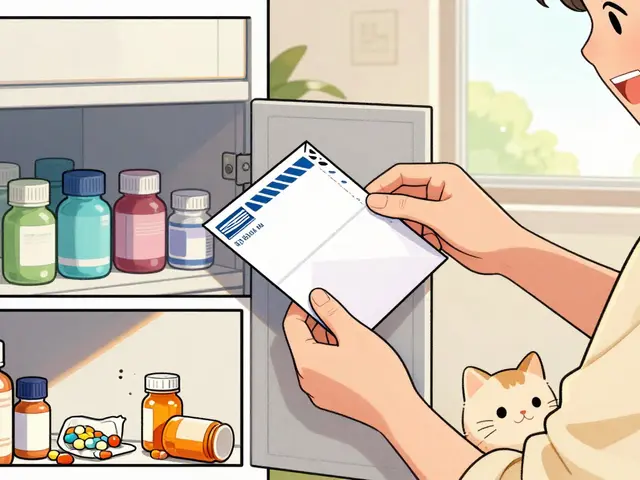
Prepaid Drug Mail-Back Envelopes for Medication Disposal: How They Work and Where to Get Them
Prepaid drug mail-back envelopes let you safely dispose of expired or unused medications by mail-no trips to a pharmacy needed. Learn how they work, what you can send, and where to get them for free.
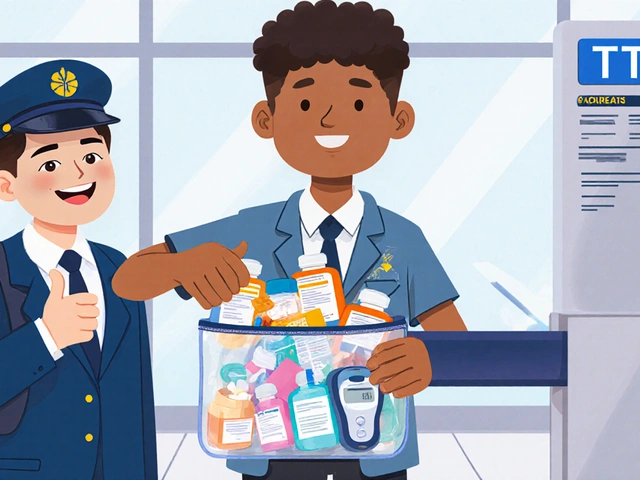
TSA Guidelines for Flying with Prescription Medications: What You Need to Know in 2025
Learn exactly how to fly with prescription medications in 2025 under TSA rules - including what’s allowed, what gets confiscated, and how to avoid delays at security. Essential for travelers with insulin, CBD, ADHD meds, or other prescriptions.
Bart Capoen
October 29, 2025 AT 08:33amiodarone is wild honestly. i had a buddy on it for afib after his mi and he swore by it but his thyroid went haywire and he needed meds just to keep his metabolism from collapsing. still works like a charm though if you can handle the baggage.